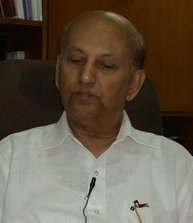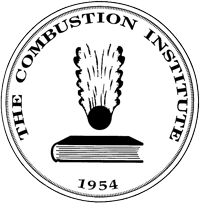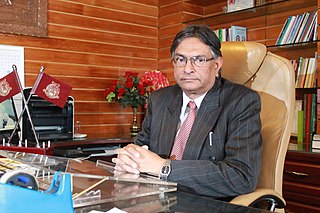Related Research Articles

The Lomonosov Gold Medal, named after Russian scientist and polymath Mikhail Lomonosov, is awarded each year since 1959 for outstanding achievements in the natural sciences and the humanities by the USSR Academy of Sciences and later the Russian Academy of Sciences (RAS). Since 1967, two medals are awarded annually: one to a Russian and one to a foreign scientist. It is the Academy's highest accolade.

Mankombu Sambasivan Swaminathan is an Indian geneticist and administrator, known for his role in India's Green Revolution, a program under which high-yield varieties of wheat and rice were planted. Swaminathan has been called the "Father of Green Revolution in India" for his role in introducing and further developing high-yielding varieties of wheat in India. He is the founder of the MS Swaminathan Research Foundation. His stated vision is to rid the world of hunger and poverty. Swaminathan is an advocate of moving India to sustainable development, especially using environmentally sustainable agriculture, sustainable food security]] and the preservation of biodiversity, which he calls an "evergreen revolution."

Calyampudi Radhakrishna Rao, FRS known as C R Rao is an Indian-American mathematician and statistician. He is currently professor emeritus at Pennsylvania State University and Research Professor at the University at Buffalo. Rao has been honoured by numerous colloquia, honorary degrees, and festschrifts and was awarded the US National Medal of Science in 2002. The American Statistical Association has described him as "a living legend whose work has influenced not just statistics, but has had far reaching implications for fields as varied as economics, genetics, anthropology, geology, national planning, demography, biometry, and medicine." The Times of India listed Rao as one of the top 10 Indian scientists of all time. Rao is also a Senior Policy and Statistics advisor for the Indian Heart Association non-profit focused on raising South Asian cardiovascular disease awareness.

Udupi Ramachandra Rao was an Indian space scientist and chairman of the Indian Space Research Organisation. He was also the Chairman of the Governing Council of the Physical Research Laboratory at Ahmedabad and Nehru Planetarium at Bengaluru and chancellor of the Indian Institute for Space Science and Technology (IIST) at Thiruvananthapuram.
Harold Williams M.Sc Ph.D FRSC was one of the premier field geologists in the history of Newfoundland geology and the foremost expert on the Appalachian Mountains of North America. An expert on the evolution and tectonic development of mountain belts, Williams advanced the theory of colliding super-continents in the 1960s and 1970s by helping to transform the notion of continental drift into the theory of plate tectonics.

The Meteoritical Society is a non-profit scholarly organization founded in 1933 to promote research and education in planetary science with emphasis on studies of meteorites and other extraterrestrial materials that further our understanding of the origin and history of the solar system.
Paul Felix Hoffman, FRSC, OC is a Canadian geologist and Sturgis Hooper Professor Emeritus of Geology at Harvard University. He specializes on the Precambrian era and is widely known for his research on Snowball Earth glaciation in the Neoproterozoic era particularly through his research on sedimentary rocks of Namibia.

The Royal Society Te Apārangi is an independent, statutory not-for-profit body in New Zealand providing funding and policy advice in the fields of sciences and the humanities.
Faqir Chand Kohli popularly known as F. C. Kohli is an Indian industrialist. He is frequently referred to as the Father of the Indian Software Industry due to his significant contribution in Indian IT industry. He was the founder and first CEO of Tata Consultancy Services, India's largest software consultancy company. He has also worked as the deputy general manager of the Tata Power Company. He is Chairman of the Board of Governors of College of Engineering, Pune.
The Society for Sedimentary Geology is an international not-for-profit, scientific society based in Tulsa, Oklahoma. It is commonly referred to by its acronym SEPM, which refers to its former name, the Society of Economic Paleontologists and Mineralogists.

Gury Ivanovich Marchuk was a prominent Soviet and Russian scientist in the fields of computational mathematics, and physics of atmosphere. Academician ; the President of the USSR Academy of Sciences in 1986–1991. Among his notable prizes are the USSR State Prize (1979), Demidov Prize (2004), Lomonosov Gold Medal (2004).
The Association of Applied Geochemists (AAG) is an international society that seeks to advance the study and application of geochemistry and represents scientists working in that field.
The Hector Medal, formerly known as the Hector Memorial Medal, is a science award given by the Royal Society of New Zealand in memory of Sir James Hector to researchers working in New Zealand. It is awarded annually in rotation for different sciences – currently there are three: chemical sciences; physical sciences; mathematical and information sciences. It is given to a researcher who "has undertaken work of great scientific or technological merit and has made an outstanding contribution to the advancement of the particular branch of science." It was previously rotated through more fields of science – in 1918 they were: botany, chemistry, ethnology, geology, physics, zoology. For a few years it was awarded biennially – it was not awarded in 2000, 2002 or 2004.

The Combustion Institute is an educational non-profit, international, scientific and engineering society whose purpose is to promote research in combustion science. The institute was established in 1954, and its headquarters are in Pittsburgh, Pennsylvania, United States. The current president of the combustion institute is James F. Driscoll.
Syed Mahmood Naqvi was an Indian Earth scientist specialising in geochemistry at the National Geophysical Research Institute (NGRI) in Hyderabad. In a four-decade career, from the 1960s through 2000s, he was the recipient of numerous awards, scientific as well as humanitarian, and served as Fellow of the Association of Applied Geochemists, Indian Geophysical Union, Andhra Pradesh Academy of Sciences and Indian National Science Academy (INSA) as well as vice-president of the Geological Society of India, the Geological Mining and Metallurgical Society of India and the Indian Society of Applied Geochemists (ISAG).

Talat Ahmad is an Indian Earth Scientist and Professor at Department of Geology, University of Delhi. He commenced his second stint as Vice Chancellor of University of Kashmir on 06 August 2018 after serving as Vice Chancellor of Jamia Millia Islamia after he resigned from the post a few months short of his full term. He was shortlisted by a Committee constituted by the Governor to shotlist a panel for the post. He had earlier taken over as Vice-Chancellor of University of Kashmir from Professor Riyaz Punjabi on 1 June 2011. Prior to this, he was teaching Geology at the University of Delhi.
Syed Wajih Ahmad Naqvi is an Indian marine scientist and the former director of the National Institute of Oceanography. His work has concentrated in oceanic water chemistry, biogeochemistry, and chemical interrelations with living organisms. He has also performed research on freshwater ecosystems. He was the Chief Indian Scientist of LOHAFEX, an Ocean Iron Fertilization experiment jointly planned by the Council of Scientific Industrial Research (CSIR), India, and Helmholtz Foundation, Germany.

Mohammad Tahir Shah is a geoscientist. He is the founder Vice Chancellor of the FATA University, FR Kohat by the Federal Government on 18 January 2016. He became the director of the National Centre of Excellence in Geology in 2013 and served the Centre for more than 34 years.
G. Taru Sharma is an Indian biologist and the head of the physiology and climatology division at the Indian Veterinary Research Institute of the Indian Council of Agricultural Research. Known for her studies on germ cell marker genes, Sharma is an elected fellow of the National Academy of Agricultural Sciences. The Department of Biotechnology of the Government of India awarded her the National Bioscience Award for Career Development, one of the highest Indian science awards, for her contributions to biosciences in 2006.
References
- ↑ "Geological Society of India - S. M. Naqvi Gold Medal". geosocindia.com. Retrieved 2014-01-30.
- ↑ "Geological Society of India, Bangalore – Nominations for the Awards – 2013". Jour Geol. Soc. India. 81. April 2013.